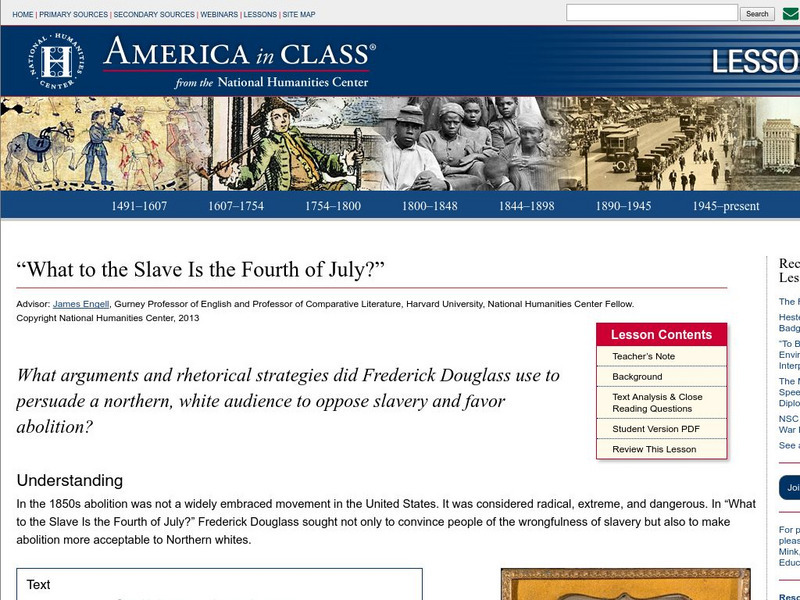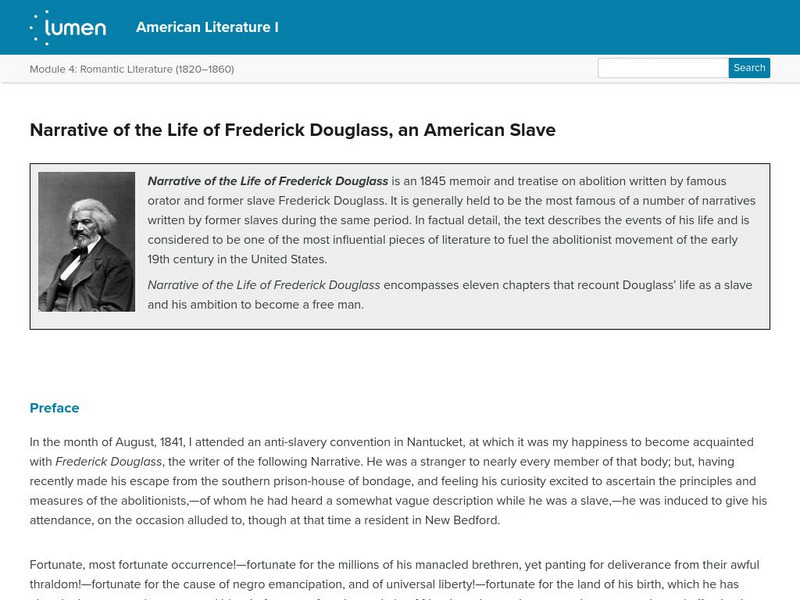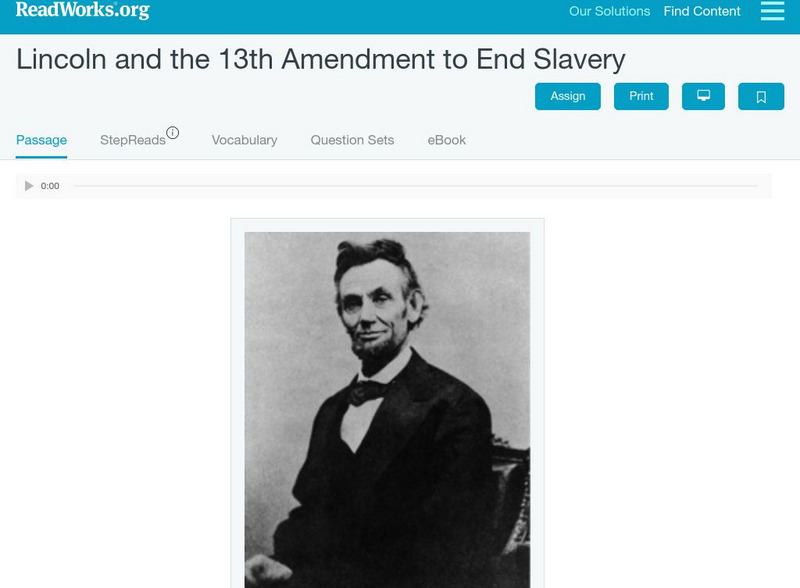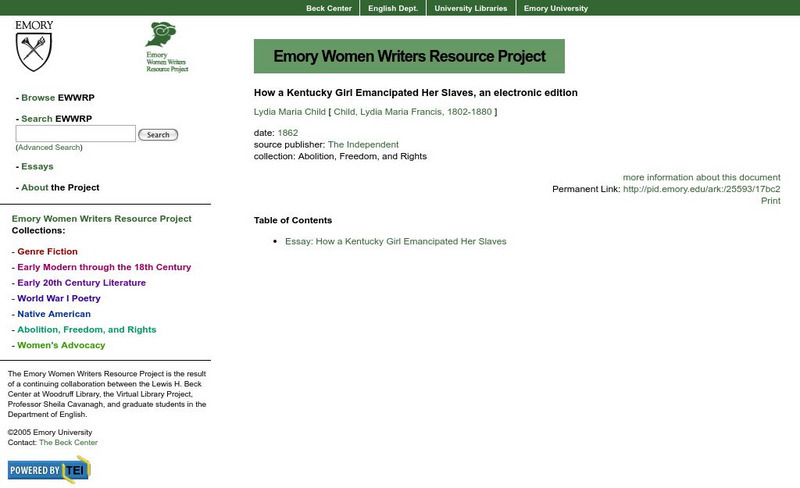Hi, what do you want to do?
Stanford University
Beyond the Bubble: Slave Quarters
[Free Registration/Login Required] Students examine a photograph of former slave quarters in Georgia and answer questions about the living conditions of slaves. They will also observe how the fact that the photograph was taken decades...
National Humanities Center
National Humanities Center: America in Class: "What to the Slave Is the Fourth of July?"
Explores the argument made by Frederick Douglass and his appeals to convince northern whites to oppose slavery and favor abolition. Lesson content includes resources for both teachers and students.
Lumen Learning
Lumen: Narrative of the Life of Frederick Douglass, an American Slave
This is the text and audio of the autobiography Narrative of the Life of Frederick Douglass, an American Slave by Frederick Douglass. This 1845 memoir and treatise on abolition encompasses eleven chapters that recount Douglass' life as a...
Other
The Abolitionist: History and Geography of the Underground Railroad
Read a comprehensive account of the Underground Railroad, how it was organized, and the routes that were used. Be sure to read all three parts.
Library of Congress
Loc: African American Mosaic: Black History and Culture
Online version of a Library of Congress exhibit, covering information about black history, including colonization, abolition, migrations, and the WPA. It is multimedia and contains hundreds of primary source documents.
Yale University
Yale New Haven Teachers Institute: Connecticut Blacks in 18th and 19th Centuries
A curriculum unit that examines the history of slavery in Connecticut, the laws permitting it, segregation, and the struggles faced by freed blacks to achieve equality.
C3 Teachers
C3 Teachers: u.s. History Module: Did Lincoln Really Want to Free Slaves? [Pdf]
A comprehensive learning module on Abraham Lincoln that includes three supporting questions accompanied by formative tasks and primary source materials, followed by a summative performance task. Students examine the evolution of...
Other
National Maritime Museum: Freedom: Abolition in Britain
Illustrated essay on the abolition of slavery in Britain.
British Library
British Library: Discovering Literature: Voices in the Campaign for Abolition
From the mid 18th century, Africans and people of African descent - many of them former slaves - began to write down their stories. This article describes these writings and assesses their role in the abolition of slavery.
British Library
British Library: Discovering Literature: African Writers and Black Thought in 18th Century Britain
This article describes how four writers, taken from Africa as children and sold into slavery, grew up to write works that challenged British ideas about race, called for African brotherhood, and demanded the abolition of the slave trade.
British Library
British Library: Discovering Literature: Travel, Colonialism and Slavery
From Robinson Crusoe to the anti-slavery activism of Olaudah Equiano and the letters of Ignatius Sancho: explore a range of writing produced during an age of travel, trade and colonial conquest, in which Britain vastly expanded its...
Read Works
Read Works: Lincoln and the 13th Amendment to End Slavery
[Free Registration/Login Required] This ReadWorks passage provides a brief history of the official end to slavery in America, the 13th Amendment. A paired passage is part of this module, along with a lower level passage with related...
Columbia University
Columbia University: Columbia University & Slavery 8. Columbia and Colonization
This website was created by faculty, students, and staff to publicly present information about Columbia's historical connections to the institution of slavery. Columbians played a prominent role in the New York Auxiliary Colonization...
British Library
British Library: Discovering Literature: Politics and Religion
The Civil Wars and the Restoration of the monarchy, the Enlightenment or 'Age of Reason', and British colonialism: investigate the political and religious contexts of Restoration and 18th-century literature.
Emory University
Lewis H. Beck Center: Child, Lydia: How a Kentucky Girl Emancipated Her Slaves
Download the full text to Lydia Maria Child's "How a Kentucky Girl Emancipated Her Slaves." This account of a woman who freed her slaves was originally written by Lydia Child in 1862 and published in The New York Tribune.
BBC
Bbc: Bitesize History: Industrial Era: Triangular Slave Trade: Interpretations
Discusses the different interpretations that historians have had of the slave trade. It includes a video of Interpretations of the abolition of slavery, questions with answers, and a link to an assessment.
Independence Hall Association
U.s. History: Mount Vernon and the Dilemma of a Revolutionary Slave Holder
Read about George Washington's dependence on slaves to increase his wealth, and his private views on slavery. What were the possibilites had he expressed these views in public?
PBS
Wnet: Thirteen: The Slave Experience: Legal Rights and Government
Using primary materials and oral histories, PBS tells the story of the slaves' legal rights and their position with the US Government.
Other
The Amistad Committee: Yale, Slavery & Abolition
This essay explores Yale University's relationship to slavery. It seeks to answer questions such as why did Yale name most of its colleges after slave owners and pro-slavery leaders? Included is a downloadable PDF, timeline, map of Yale,...
Other
Douglass Archive: What to the Slave Is the 4th of July?
This site from the Douglass Archive provides the complete text with an introduction to the speech and footnotes.
Penguin Publishing
Penguin Random House: "Frederick Douglass American Slave" [Pdf]
Teacher guide for Douglass's biography features 24 pages of chapter-by-chapter study questions, quotations, and activities. Valuable post-reading activities as well as methods for eliciting student responses also included. This is a .pdf...
Columbia University
Columbia University:columbia University & Slavery 6.columbians & the Manumission
This website was created by faculty, students, and staff to publicly present information about Columbia's historical connections to the institution of slavery. This article explains the role Columbian's played in the Manumission Society...
Independence Hall Association
U.s. History: The Emancipation Proclamation
The Emancipation Proclamation in 1863 really didn't free a single slave. Read about why that was true, but also find out why Abraham Lincoln felt is was absolutely necessary to make a stand on ending slavery when he did, and how the...
Emory University
Lewis H. Beck Center: Child, Lydia Maria: Charity Bowery
Download and read Lydia Maria Child's "Charity Bowery," originally written in 1839, which tells the story of a freed slave's choices as she is allowed to take only one of her children out of slavery.

















